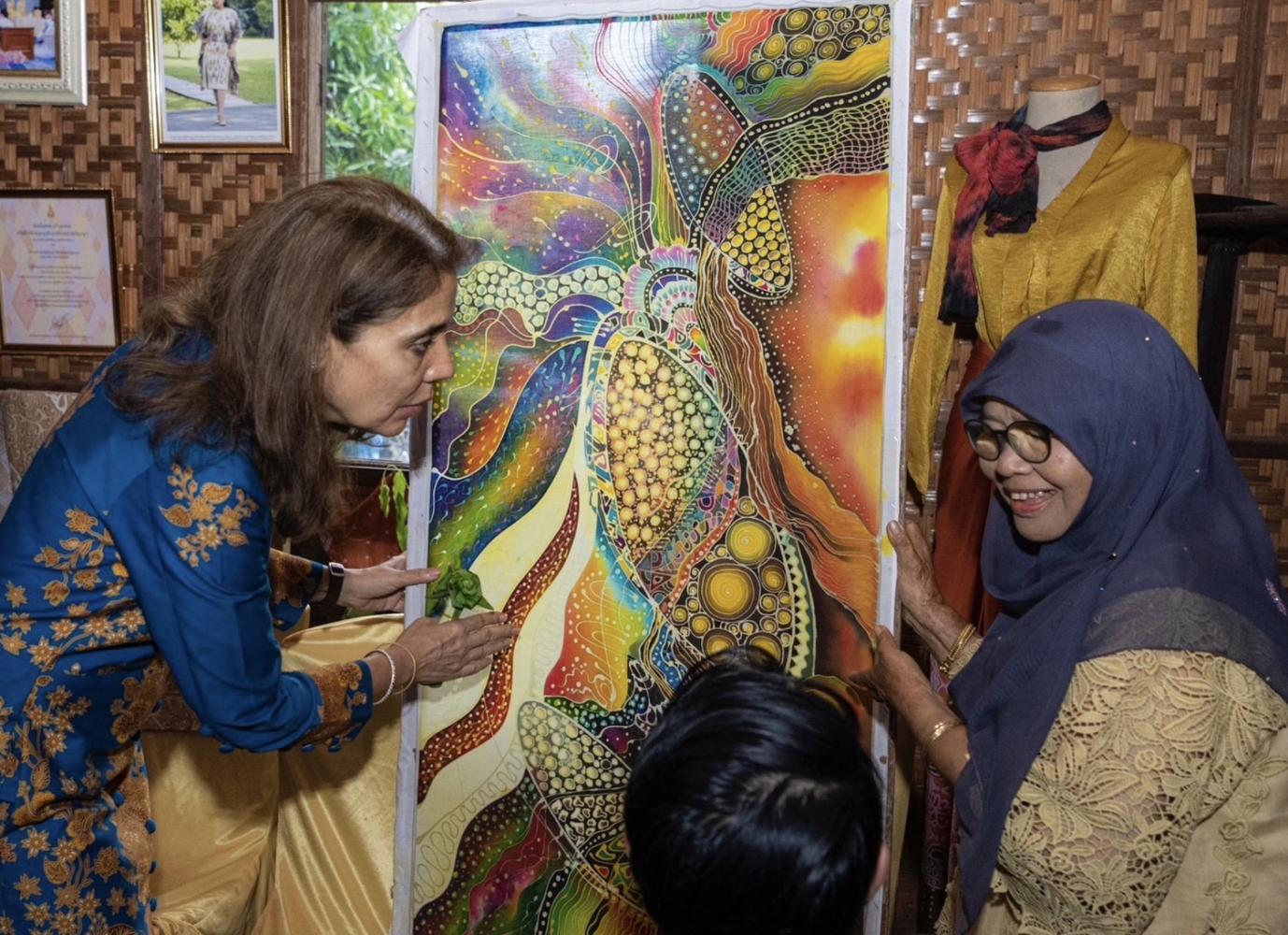
The Ministry of Interior has expanded the sustainable village project initiated by HRH Princess Sirivannavari Nariratana Rajakanya, who has shared her vision to eradicate poverty in remote areas.
Making a recent visit to the deep South in Songkhla and Pattani province, the ministry's permanent secretary, accompanied by a senior UN official, visited some craft communities that were the role models for sustainable villages in the South. Locals have used their local wisdom in batik cloth and practised the sufficiency economy philosophy of the late HM King Bhumibol Adulyadej The Great to grow their vegetables and fruits to increase food security for their families.
The ministry's permanent secretary, Suttipong Juljarern, explained that the princess wished to make villages in remote areas countrywide enjoy better living conditions through sustainable development under the ministry's assistance. The ministry last year signed an MoU with the United Nations to build one sustainable village in one sub-district (tambon) as a showcase for sustainable development under the UN's Sustainable Development Goals (SDGs).
He said the agreement supported local villages to have security in food, water and medicine, create social equality, enjoy a clean environment and promote local wisdom. He said cooperation from all stakeholders was needed to make the project successful.
Patimoh Sadeeyamu, the first Muslim female governor who works in Pattani province, said that women are affected most by violence in the deep South. Therefore, residents proposed that local authorities should play a key role in empowering women in both economic and social aspects. The province works with local and international women leadership development agencies, including UN Women, the Muslim Women's Council from Malaysia and the Community Development Department to empower them.
"Women have played a key role in driving the province's economic growth. Leaders of Otop [One Tambon, One Product] groups are 90% women. We should empower women with the support of all stakeholders," she said.
Gita Sabharwal, UN Resident Coordinator for Thailand, said that she was very appreciative of the attempt to bring women to the forefront of development, that could also help develop security because women's leadership can create trust among people. She hoped to see the results attributed to women's leadership through a locally based approach.
She also admired HRH Princess Sirivannavari Nariratana Rajakanya, who has devoted her efforts to protecting and preserving local wisdom in woven cloth in every region, saying the sustainable village approach has marked a big step in terms of the environment and people's earning security. The princess has encouraged locals to apply natural colours to dye their fabrics instead of using chemical colours to protect the environment. She also recommended the local reuse of the material to cut waste.
"People are now concerned about waste from fashion. But the princess's project is something different. I would like to express appreciation to the designer teams working together to push the local fabric business sustainably. This is an interesting showcase of Thailand's sustainability to be presented in the UN's meeting in New York," she said.
The team visited the Yaring Batik Group in Pattani's Yaring district. Kaneungnit Bhattarapongnopkul, a leader of the group, said the princess had guided them with creative designs and recommended using raw materials from nature that they could find in their village.
She said her batik group earned more income, about 40,000-60,000 baht a month, from the batik fabric business due to impressive modern styles recommended by the princess, adding that the royal "Khor Chaofah Sirivannavari" motif, represented by the letter "S", could be combined with local patterns perfectly. The princess had recommended to the group colour tones that make their batik cloth look more fashionable, she said.
The princess's work on preserving local wisdom through traditional cloth created income for locals and also an opportunity for better living conditions for children and youths in the deep South.
Napasakorn Ayama, 17, who has lacked educational opportunities due to poverty, earns about 3,000 baht a month from the Me-D Na Thap Batik Group in Songkhla's Chana district. Having worked with the group for four months, he dreams of pursuing higher education, which could materialise via his batik painting job with the group.
The group was founded by Jantima Sukmetta, 53, who lost her mother during an ambush by a group of separatists in 2015. She used the 85,000 baht of compensation given by the government for family victims of unrest in the troubled region to run the batik business. She wanted to respond to the hurt with kindness and make her homeland famous for batik arts.
She teaches and provides opportunities for youths to learn batik arts. At present, she employs 14 youths so they can make money while they are studying.
A team of designers brought by the princess came to help the group develop high-value products based on outstanding patterns designed by the princess and recommended natural colours for batik cloth. The group successfully generated more income, allowing sustainable development for the community. Today, the Me-D Na Thap Batik Group is also known as a tourist attraction in Songkhla.







